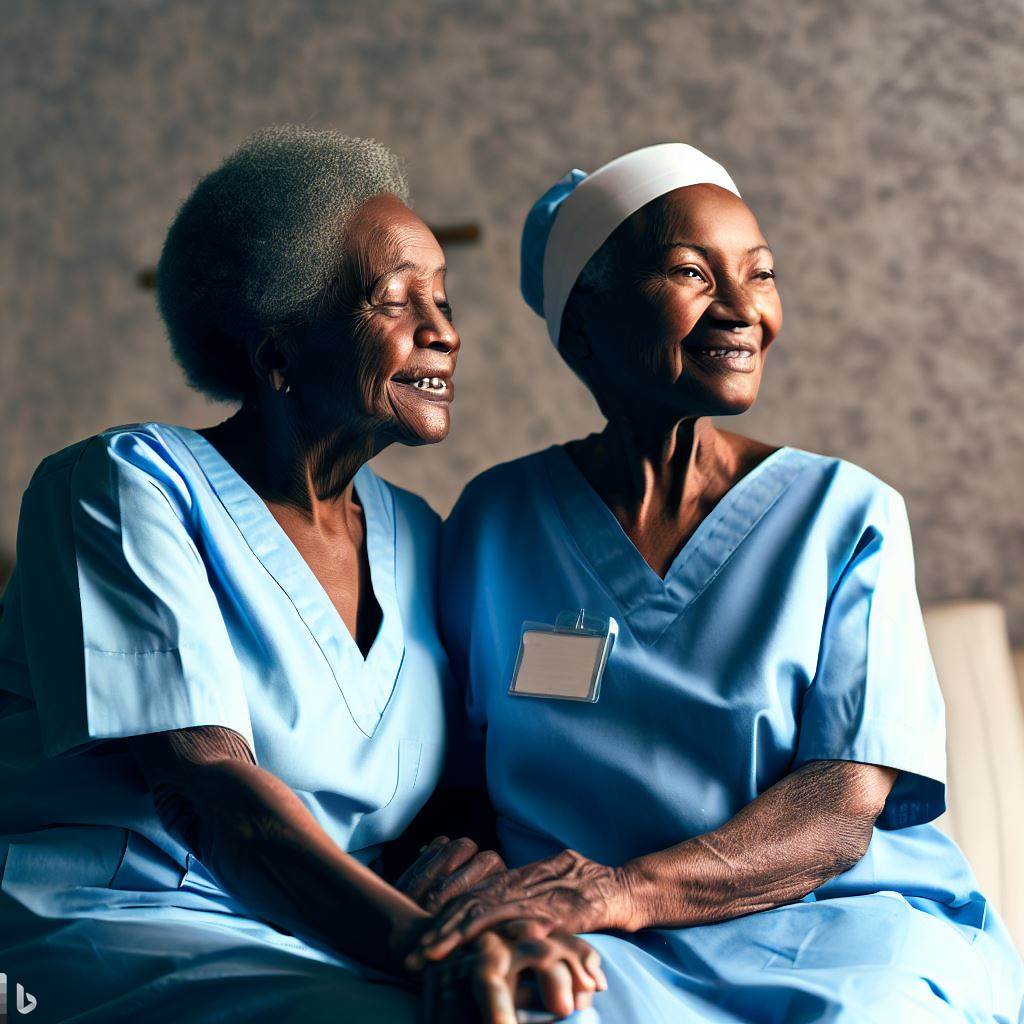Introduction
Definition and Importance of Geriatric Nursing
Geriatric nursing plays a vital role in catering to the unique needs of elderly individuals.
It is a specialized area of nursing that focuses on the care and support of the aging population.
With the advancements in medical science and a better understanding of aging-related issues, geriatric nursing has gained immense importance in recent years.
Overview of the Growing Field of Geriatric Nursing in Nigeria
The field of geriatric nursing is rapidly growing in Nigeria.
As the country’s elderly population continues to increase, there is an amplified demand for healthcare professionals with expertise in geriatric care.
This growth reflects the recognition of the unique needs and challenges that come with aging.
In Nigeria, the growing field of geriatric nursing has led to the development of specialized training programs and courses.
These programs aim to equip nurses with the necessary knowledge and skills to provide comprehensive care to elderly patients.
They address a wide range of topics, including age-related diseases, management of chronic conditions, and psychosocial support.
The importance of geriatric nursing is evident from the impact it has on the overall well-being of elderly individuals.
Geriatric nurses are trained to assess and manage conditions specific to aging, such as mobility issues, cognitive decline, and chronic pain.
Their role extends beyond medical care as they also provide emotional support and promote a sense of dignity for their patients.
In summary, geriatric nursing is a growing field in Nigeria due to the increasing elderly population.
The specialized care provided by geriatric nurses is crucial in addressing the unique needs of the aging population and improving their overall quality of life.
As the demand for geriatric nursing services continues to rise, it is important to recognize and support the growth of this field in Nigeria.
The Aging Population in Nigeria
Statistics and trends of the elderly population in Nigeria
The elderly population in Nigeria is growing at a rapid pace.
In 2019, it was estimated that there were over 9 million elderly individuals in Nigeria.
This number is expected to double by 2050, reaching 18 million.
Life expectancy in Nigeria has increased from 47 years in 1960 to 54 years in 1990 and 54.5 years in 2020.
Improved healthcare and advancements in medical technology have contributed to the increase in life expectancy.
Urbanization and migration have also led to an aging population in urban areas.
As more young people move to cities in search of better opportunities, the proportion of elderly individuals in rural areas is higher.
The elderly population faces various challenges in Nigeria, including poverty, limited access to healthcare, and social isolation.
Many elderly individuals in Nigeria rely on their families for support and care.
However, the traditional family structure is changing, with more young people moving away from their elderly parents.
Factors contributing to the increase in the elderly population
Advancements in healthcare have led to a decline in infant mortality rates and an increase in life expectancy.
This has resulted in a larger proportion of the population reaching old age. Improvements in healthcare also mean that more elderly individuals are surviving illnesses and living longer.
Improved sanitation and access to clean water have also contributed to the increase in life expectancy. As the standard of living continues to improve in Nigeria, more people are able to access healthcare and live longer lives.
Additionally, changes in lifestyle and cultural attitudes towards family planning have resulted in larger families.
With more children being born, there is a higher likelihood of a larger elderly population in the future.
The decrease in fertility rates has also contributed to the aging population, as there are fewer young people entering the workforce.
The aging population in Nigeria poses various challenges for the healthcare system and social welfare programs.
There is a need for increased investment in healthcare facilities, geriatric care training, and support for caregivers.
By understanding the statistics and trends of the elderly population in Nigeria and the factors contributing to its growth, policymakers and healthcare professionals can better prepare for the future.
Providing adequate support and resources for the aging population is crucial in ensuring their health, well-being, and quality of life.
Challenges in Geriatric Nursing in Nigeria
Geriatric nursing in Nigeria faces several challenges that hinder the provision of quality care for elderly individuals.
These challenges include limited resources and infrastructure, lack of specialized training programs, and cultural barriers and stigmas surrounding eldercare.
Limited resources and infrastructure
One of the major challenges in geriatric nursing in Nigeria is the limited availability of resources and inadequate infrastructure.
Public healthcare facilities often lack the necessary equipment, medications, and supplies to meet the specific needs of geriatric patients.
This scarcity compromises the quality of care provided.
Additionally, a lack of sufficient healthcare facilities leads to overcrowding and inadequate patient-to-nurse ratios.
This imbalance puts a strain on nurses, making it difficult to provide individualized care and attention to elderly patients.
It further exacerbates the challenges faced in geriatric nursing.
Lack of specialized training programs
Geriatric nursing requires specialized knowledge and skills to address the unique physical, emotional, and social needs of elderly individuals.
However, Nigeria lacks comprehensive training programs that focus specifically on geriatric care.
This leads to a shortage of qualified geriatric nurses in the country.
Without adequate training, nurses may struggle to provide appropriate care for geriatric patients.
This includes understanding age-related conditions, medication management, and promoting healthy aging.
The absence of specialized training programs limits the capacity of healthcare professionals to deliver optimal care.
Cultural barriers and stigmas surrounding eldercare
Cultural attitudes and perceptions surrounding aging and eldercare present significant challenges for geriatric nursing in Nigeria.
In some Nigerian communities, caring for the elderly is considered the responsibility of family members rather than healthcare professionals.
This cultural expectation often results in families providing minimal support to their elderly loved ones while relying on geriatric nurses to fulfill all caregiving needs.
It creates a burden on nurses, who may not have the resources or authority to address all aspects of eldercare.
Furthermore, stigmas and misconceptions about aging can lead to neglect or mistreatment of elderly individuals.
These negative perceptions may discourage elderly patients from seeking medical care or disclosing their health concerns, making it difficult for nurses to provide effective and comprehensive support.
To overcome these challenges, it is crucial to invest in improving healthcare infrastructure, increasing funding for geriatric nursing, and establishing specialized training programs.
It is equally important to educate communities about the importance of geriatric care and break the cultural barriers and stigmas surrounding aging.
Geriatric nursing in Nigeria can be elevated to a higher standard by addressing these challenges and taking proactive measures to ensure the well-being and quality of life for the aging population.
Read: The Path to Becoming a Surgeon in Nigeria
Importance of Geriatric Nursing in Nigeria
Providing specialized care for elderly patients’ unique needs
- Geriatric nursing focuses on addressing the specific and complex health issues of older adults.
- Nurses trained in geriatrics have a deep understanding of the aging process and its challenges.
- They possess the knowledge and skills to manage chronic diseases commonly seen in older patients.
- Geriatric nurses provide personalized care plans tailored to meet the unique needs of each elderly individual.
- They ensure that elderly patients receive appropriate medications, therapies, and treatments for their conditions.
- By providing specialized care, geriatric nurses contribute to the overall physical and mental well-being of older adults.
Ensuring improved quality of life for older adults
- Geriatric nursing aims to enhance the quality of life for elderly individuals.
- Nurses in this field prioritize the promotion of independence and functional abilities in older adults.
- They create environments that are safe, comfortable, and conducive to the well-being of elderly patients.
- Geriatric nurses assist with activities of daily living, such as bathing, dressing, and mobility, empowering older adults to maintain their dignity.
- They offer emotional support, taking into account the psychological and social needs of older patients.
- Geriatric nurses advocate for the rights and preferences of elderly individuals, promoting autonomy and self-determination.
Contributing to the overall healthcare system in Nigeria
- Geriatric nursing plays a crucial role in the development of Nigeria’s healthcare system.
- With the aging population on the rise, the demand for geriatric care is increasing.
- Geriatric nurses contribute to preventative healthcare by promoting healthy aging practices and disease prevention.
- They collaborate with other healthcare professionals to develop comprehensive care plans for older adults.
- Geriatric nurses educate families and caregivers about best practices in caring for elderly individuals.
- By focusing on the unique needs of older adults, geriatric nursing improves the efficiency and effectiveness of healthcare delivery in Nigeria.
In essence, geriatric nursing in Nigeria holds great importance in addressing the specialized needs of elderly patients, improving their quality of life, and contributing to the overall healthcare system.
Geriatric nurses provide individualized care, promote independence, and advocate for the well-being of older adults.
With the growing elderly population, the demand for geriatric nursing will continue to rise, making it a vital field in the Nigerian healthcare system.
Read: Nursing Unions in Nigeria: Their Role and Impact

Growing Opportunities in Geriatric Nursing
Increasing demand for geriatric nurses in hospitals and nursing homes
- The field of geriatric nursing in Nigeria is witnessing a significant rise in demand.
- Hospitals and nursing homes are actively seeking trained geriatric nurses to cater to the aging population.
- Geriatric nurses play a crucial role in providing specialized care and support to elderly patients.
- They possess the knowledge and skills to address the unique needs and challenges faced by senior citizens.
- The increasing demand for geriatric nurses creates ample job opportunities and career growth prospects.
- Qualified individuals who pursue geriatric nursing can expect a fulfilling and rewarding professional future.
Development of geriatric care facilities and specialized clinics
- The growth of geriatric nursing is leading to the establishment of dedicated geriatric care facilities.
- These facilities focus on meeting the physical, emotional, and mental health requirements of elderly individuals.
- Geriatric care facilities provide a holistic approach to healthcare, emphasizing quality of life and patient well-being.
- Specialized clinics are also emerging to provide comprehensive healthcare services tailored to the needs of older adults.
- These clinics house geriatric nurses who specialize in geriatric assessment, treatment, and ongoing care management.
- The development of such specialized care settings opens up new avenues for geriatric nurses to practice and excel in their careers.
Potential for research and innovation in geriatric nursing
- The field of geriatric nursing in Nigeria offers vast potential for research and innovation.
- Geriatric nurses can actively contribute to research studies focused on improving elderly care practices.
- They can explore methods to enhance the quality of life, promote healthy aging, and address age-related ailments.
- Research and innovation in geriatric nursing have the potential to influence healthcare policies and guidelines in Nigeria.
- Geriatric nurses equipped with research skills can drive positive change and influence best practices in the field.
- The scope for innovation in geriatric nursing extends to technological advancements that can aid in elderly care.
In short, the field of geriatric nursing in Nigeria is witnessing remarkable growth and presents numerous opportunities.
The increasing demand for geriatric nurses in hospitals and nursing homes, along with the development of specialized care facilities and clinics, provides a promising career path.
Additionally, the potential for research and innovation allows geriatric nurses to contribute to improving elderly care practices and influence healthcare policies in the country.
With the aging population in Nigeria, the role of geriatric nurses becomes increasingly crucial in providing holistic and specialized care to improve the well-being of older adults.
Read: A Day in the Life of a Nigerian Pediatrician
Find Out More: Impact of Speech-Language Pathology in Nigeria’s Healthcare
Steps to Pursue a Career in Geriatric Nursing
Academic Requirements and Specialized Training Options
- Research academic institutions in Nigeria offering nursing programs focused on geriatric care.
- Ensure the program is accredited and meets the necessary academic requirements.
- Consider pursuing a Bachelor’s degree in Nursing for a solid foundation in nursing principles.
- Explore specialized training options such as certification programs or postgraduate degrees in Geriatric Nursing.
- Stay updated on advancements in geriatric nursing through continuous education and professional development.
Professional Organizations and Networking Opportunities
- Join professional organizations like the Gerontological Society of Nigeria to connect with other geriatric nurses.
- Attend conferences, webinars, and seminars related to geriatric care to expand your knowledge and network.
- Engage in online forums and discussion groups to have meaningful conversations with experienced geriatric nurses.
- Seek mentoring opportunities to learn from experienced professionals in the field.
- Establish a strong professional network by attending local and national nursing events.
Recommendations for Gaining Experience in Geriatric Care Settings
- Look for internships or volunteer opportunities in hospitals, nursing homes, or geriatric care facilities.
- Seek part-time employment in geriatric care settings to gain hands-on experience while studying.
- Shadow experienced geriatric nurses to understand the challenges and rewards of the field.
- Embrace opportunities to work with interdisciplinary teams to enhance your understanding of holistic geriatric care.
- Stay updated on geriatric care guidelines and best practices to provide quality care to elderly patients.
Geriatric Nursing in Nigeria presents promising career prospects with diverse opportunities. Aspiring geriatric nurses must meet academic requirements and consider specialized training options.
Selecting reputable nursing programs in Nigeria with a focus on geriatric care is vital.
A Bachelor’s degree in Nursing offers a strong foundation, while postgraduate degrees or certifications in Geriatric Nursing provide specialized skills.
Joining the Gerontological Society of Nigeria and attending related conferences fosters networking and professional growth.
Gaining practical experience is essential, attainable through internships, volunteer work, or part-time roles in geriatric care settings. Shadowing experienced geriatric nurses offers valuable insights.
Engaging with interdisciplinary teams allows for a holistic approach to geriatric care. Adhering to updated guidelines and best practices ensures the delivery of high-quality care.
A career in geriatric nursing promises job satisfaction and the chance to positively impact the lives of elderly individuals in Nigeria.
Read: Combatting Common Misconceptions about Doctors in Nigeria.
Successful Examples of Geriatric Nursing in Nigeria
Case studies of organizations or individuals making a difference
Geriatric Nursing in Nigeria has undergone significant improvement through the dedicated efforts of organizations and individuals, implementing innovative strategies and specialized care.
The Nigerian Geriatric Care Foundation (NGCF) is committed to enhancing geriatric nursing in the country, providing training and education for nurses working with the elderly population.
One outstanding success story is Nurse Fatima Ali, whose 10 years of experience as a geriatric nurse led her to introduce groundbreaking care strategies in a local nursing home, greatly improving elderly residents’ quality of life.
The Lagos State University Teaching Hospital (LASUTH) has also made remarkable progress, establishing a specialized geriatric nursing unit that offers comprehensive physical, emotional, and social support to older adults.
Mrs. Adesanya, an 80-year-old patient with dementia, experienced significant improvement through personalized care and cognitive stimulation therapies, leading to a fulfilling life despite her diagnosis.
Implementation of a falls prevention program in a geriatric care facility resulted in a notable reduction in fall-related injuries among residents, credited to proactive measures taken by nursing staff.
Intergenerational volunteer programs, initiated by Geriatric nurse Mrs. Ahmed, have positively impacted the mental well-being of both volunteers and the elderly through companionship and support.
Annual conferences organized by the Geriatric Nursing Association of Nigeria (GNAN) have fostered collaboration and innovation among nurses and healthcare professionals, sharing best practices and research findings in geriatric nursing.
Specialized rehabilitation services in geriatric nursing facilities have empowered older adults to regain independence and enhance their quality of life through physiotherapy and occupational therapy.
Overall, these successes underscore the importance of specialized training, infrastructure, personalized care, and community involvement in advancing geriatric nursing in Nigeria. They serve as inspiring examples for further advancements in the field.
Read: The Doctor-Patient Relationship: A Nigerian Context
Conclusion
Recap of the importance and growth of geriatric nursing in Nigeria
Throughout this blog post, we have discussed the significance of geriatric nursing in Nigeria.
The aging population in the country is increasing, leading to a growing need for specialized care for the elderly.
Geriatric nurses play a crucial role in providing comprehensive healthcare to this vulnerable population.
We have also explored how the field of geriatric nursing has evolved in Nigeria.
With advancements in healthcare and a greater understanding of age-related diseases, geriatric nursing has expanded its scope of practice to meet the specific needs of older adults.
Encouragement for individuals interested in pursuing a career in the field
If you are passionate about caring for the elderly and making a positive impact on their lives, a career in geriatric nursing may be the right path for you.
Nigeria offers various opportunities for individuals interested in this field, both in hospitals and long-term care facilities.
Geriatric nursing provides a rewarding career where you can make a difference in the lives of older adults and their families.
Your expertise in managing the unique health challenges of the elderly will be invaluable in improving their overall well-being.
Final thoughts on the future of geriatric nursing in Nigeria
The future of geriatric nursing in Nigeria is promising. With the aging population expected to continue growing, the demand for geriatric nurses will only increase.
This opens up opportunities for career advancement, specialization, and research in the field.
It is essential for healthcare professionals, policymakers, and educators to recognize the importance of geriatric nursing and invest in its growth.
By improving access to specialized education and training, we can ensure better care and outcomes for older adults in Nigeria.
As we look ahead, let us continue to support and advocate for geriatric nursing in Nigeria.
Together, we can build a healthier and more compassionate society for our aging population.





Great write up dome. If you are a nurse,we can collaborate to produce geriatric nurses. Other fields in health care are making move to achieve the goal of geriatric care. Call me on 08135406714
Surely, I definitely will.